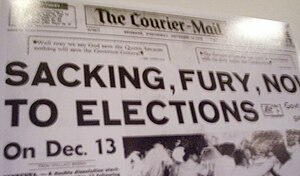 Image via Wikipedia
Image via WikipediaJust like any other country beset by internal turmoil due to political issues, Australia has many interesting historical events. One such event was the infamous dismissal of Prime Minister Gough Whitlam from his post on November 11, 1975.
The dismissal shocked the country as a whole, not only because it happened on the same day as Remembrance Day, when the whole country honors its fallen during wars; or during the anniversary of the hanging of Ned Kelly, the country's most notorious bandit during its early days; but because such an act has never happened before nor has ever been attempted before.
The Dismissal happened after the then Governor-General Sir John Kerr summoned his constitutional power to remove Gough Whitlam from his post, and appoint opposition leader Malcolm Fraser to the post of caretaker Prime Minister.
Gough Whitlam was the Labor Party's leader who challenged the 23 year reign of Conservative Party rule during the 1972 election. Initially, Whitlam was seen as an able leader of the country, implementing wide ranging reforms and many programs for social improvement. However, his administration was also plagued by several scandals that involved some of his cabinet members. One of the most controversial scandals was known throughout the country as the Loans Affair.
All throughout the administration of Whitlam, the Conservative Party in the Senate continually threatened to block appropriation bills for government expenses. At this time, the opposition had the majority in the Senate (the upper house of Parliament).
The real turning point came when in 1975, the Senate pressured the Prime Minister to dissolve the House of Representatives and call an election by deferring to vote on expenditure bills of the government. This standoff continued for weeks, with both sides not giving any compromises. The government in the meantime tried to explore alternative means to fund government expenditure by pressuring Liberal or Conservative senators to support the bills. The event continued until the 11th of November, when the threat of the government potentially being unable to meet its financial obligations hung all throughout the country.
The crisis came to an abrupt halt when the Governor-General suddenly dismissed the Prime Minister and put in the opposition leader Malcolm Fraser. Such an act put Fraser into the chair of the Prime Minister for barely over a month. A double dissolution election on December 3 the same year defeated the Whitlam Government.
At the same time, the Senate also approved the Supply Bills, granting the government the means to once again meet its financial obligations. Speculation raged all throughout the country regarding the legitimacy and constitutional basis of the dismissal.
Since the Australian Constitution has not been changed since that time, the Dismissal can potentially happen again, at least in theory. The 2010 Federal Election may be a legal election, but leaders of the country after this event may still be subject to the dismissal event that abruptly ended Whitlam's term.
Article Source: http://EzineArticles.com/?expert=Harvey_Russell
http://EzineArticles.com/?A-Glance-at-History---The-Dismissal&id=4777797

No comments:
Post a Comment